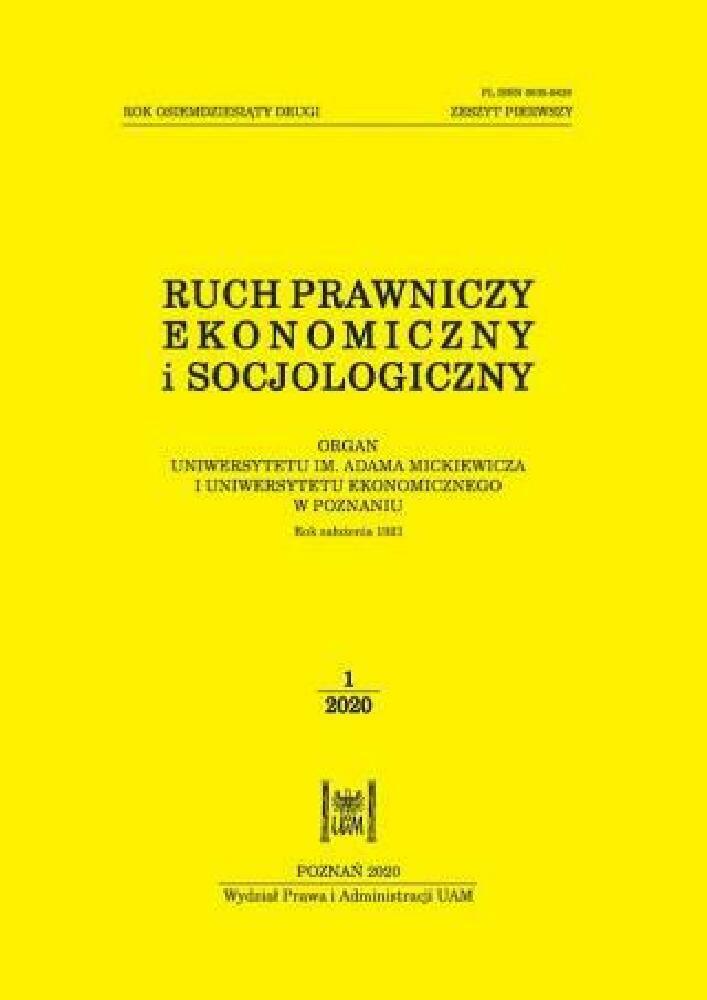Abstract
The article presents the key ideas of Czesław Znamierowski’s 1911 doctoral dissertation on the concept of truth in pragmatism (Der Wahrheitsbegriff im Pragmatismus), thus far not discussed in the literature, and the impact it had on some of his later ideas in the philosophy and theory of law. His polemic against pragmatism reinforced his later views on science and logic, and in particular on the problem of the truth-value of sentences. This founding insight of Znamierowski’s anti-psychologism in the philosophy of law, namely the independence of logic from mental states, provides a deeper explanation of a dualism in his theory of the legal norm: the ascription of both truth-value and validity, mutually independent, to legal norms. When analysed with regard to Znamierowski’s epistemological oscillation between empiricism and apriorism, Wahrheitsbegriff may also enable a better understanding of the origins of his objectivist social ontology and of such legal-theoretical concepts as ‘construction norm’ and ‘thetic act’.
References
Armstrong, D.M. (1973). Belief, Truth and Knowledge. London.
Barwicka-Tylek, I. (2010). W kwestii „psychologiczności” psychologicznej teorii prawa Leona Petrażyckiego. Państwo i Prawo 65(2): 44–56.
Brandom, R.B. (2011). Perspectives on Pragmatism: Classical, Recent, and Contemporary. Cambridge.
Buczyńska-Garewicz, H. (1970). Wartość i fakt. Rozważania o pragmatyzmie. Warsaw.
Buczyńska-Garewicz, H. (1973). James. Warsaw.
Calcaterra, R.M., Dreon, R. (eds.) (2017). Pragmatism and psychologism. European Journal of Pragmatism and American Philosophy 9(1).
Czepita, S. (1987). Czesława Znamierowskiego koncepcja „redukcji indywidualizującej”. Ruch Prawniczy, Ekonomiczny i Socjologiczny 49(3): 63–73.
Czepita, S. (1988). Koncepcje teoretycznoprawne Czesława Znamierowskiego. Poznań.
Godden, D.M. (2005). Psychologism in the logic of John Stuart Mill: Mill on the subject matter and foundations of ratiocinative logic. History and Philosophy of Logic 26(2): 115–143.
Grobler, A. (2008). Metodologia nauk. Kraków.
Haack, S. (2018). The pragmatist tradition: lessons for legal theorists. Washington University Law Review 95(5): 1049–1082.
Ingarden, R. (1963). Z badań nad filozofią współczesną. Dzieła filozoficzne. Volume 6. Warsaw.
James, W. (1897). The Will to Believe, and Other Essays in Popular Philosophy. New York.
James, W. (1907). Pragmatism, a New Name for Some Old Ways of Thinking: Popular Lectures on Philosophy. New York.
Judycki, S. (1993). Co to jest fenomenologia? Przegląd Filozoficzny – Nowa Seria 2(1): 25–38.
Kawalec, P. (2010). Woluntaryzm epistemologiczny Williama Jamesa. Próba rekonstrukcji na gruncie probabilizmu B. van Fraassena. Przegląd Filozoficzny – Nowa Seria 19(4): 283–295.
Kołakowski, L. (2000). Kultura i fetysze. Warsaw.
Lalande, A. (1908). Pragmatisme, humanisme, et vérité. Revue Philosophique de la France et de l’Étranger 65: 1–26.
Lorini, G. (2010). Ontologia społeczna Czesława Znamierowskiego. Ruch Prawniczy, Ekonomiczny i Socjologiczny 72(4): 21–30.
Lorini, G., Żełaniec, W. (2016). Czesław Znamierowski’s social ontology and its phenomenological roots, [in:] A. Salice, H.B. Schmid (eds.), The Phenomenological Approach to Social Reality. History, Concepts, Problems. Cham: 75–89.
Merezhko, A.A. (2012). The mystery of a legal philosopher’s death: L.I. Petrazhitskii. Journal of Comparative Law 108(7): 108–114.
Meyer, M. (1908). The exact number of pragmatisms. The Journal of Philosophy, Psychology and Scientific Methods 5: 321–326.
Perz, Z. (1966). U podstaw poglądów etycznych Czesława Znamierowskiego. Studia Philosophiae Christianae 2(1): 135–164.
Schiller, F.C.S. (1902). Axioms as postulates, [in:] H. Sturt (ed.), Personal Idealism: Philosophical Essays by Eight Members of the University of Oxford. London: 47–134.
Schiller, F.C.S. (1905). The Definition of ‘Pragmatism’ and ‘Humanism’. Mind 54(14): 235–240.
Schiller, F.C.S. (1907). Studies in Humanism. London.
Sidgwick, A. (1905). Applied axioms. Mind 54(14): 42–57.
Tworak, Z. (1996). Logika wobec myślenia. Nowa Krytyka 7: 73–91.
Ziembiński, Z. (1963). Normy tetyczne a normy aksjologiczne w koncepcji Cz. Znamierowskiego. Studia Filozoficzne 33(2): 85–100.
Ziembiński, Z. (1968). Czesław Znamierowski 1888–1967. Ruch Filozoficzny 26(4): 299–302.
Ziembiński, Z. (1976). Practical Logic. Dordrecht.
Ziółkowski, J. (1987). Socjologiczna koncepcja narodu Czesława Znamierowskiego. Ruch Prawniczy,
Ekonomiczny i Socjologiczny 49(3): 13–27.
Znamierowski, C. (1912). Der Wahrheitsbegriff im Pragmatismus. Inaugural-Dissertation zur Erlangung der Philosophischen Doktorwürde, Vorgelegt der Hohen Philosophischen Fakultät der Basler Universität. Warsaw.
Znamierowski, C. (1921). O przedmiocie i fakcie społecznym. Przegląd Filozoficzny 24(1/2): 1–33.
Znamierowski, C. (1925). Psychologistyczna teoria prawa. Analiza krytyczna. Przegląd Filozoficzny 25(1): 1–78.
Znamierowski, C. (1934). Podstawowe pojęcia teorii prawa. Część pierwsza. Układ prawny i norma prawna. 2nd edition. Poznań.
Znamierowski, C. (1938). Rehabilitacja narodu. Poznań.
Znamierowski, C. (1947/1948). Prolegomena do nauki o państwie. 2nd edition. Poznań.
Znamierowski, C. (1957). Oceny i normy. Warsaw.
License
Copyright (c) 2020 WPiA UAM

This work is licensed under a Creative Commons Attribution-NonCommercial-NoDerivatives 4.0 International License.





